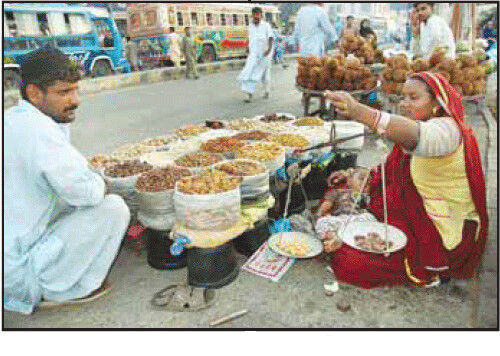- The government must recognise and protect the value of street vendors.
- From the corners of Bangalore to the urban heart of Dhaka, streams of street vendors or ‘hawkers’ are a ubiquitous sight in busy city spaces across Asia. Temporary or mobile structures offering city-favourite foods, affordable textiles, and countless other goods and services, play a key role in local livelihoods. It is difficult to imagine a Biratnagar without its endless lines of Pani Puri stalls or a Baneshwor without its long lines of vegetable sellers. The street market is also inextricably woven into our history—variations of the haat bazaar in the hilly regions or hatiyain in the Tarai regions have existed throughout Nepal for centuries.
- But beyond their importance in the social lives of urban-dwellers, the street trade has served as an important source of employment and income. And in doing so, it has invariably encouraged entrepreneurial innovation and discouraged out-migration. As an important part of the informal economy, these businesses particularly support illiterate communities by creating opportunities and an accessible means of livelihood. And yet, despite their significance, the value of street vendors has long been overlooked in the economic sector.

- Kathmandu is no exception. While Kathmandu Metropolitan City (KMC) allows vendors into certain streets before 9 am and after 6:30 pm, these timings fall outside peak business hours, ultimately barring vendors from maximising their profits. Various other limiting regulations have been enforced—including restrictions on locations. Throughout the years, KMC has also issued various attempts to remove street hawkers from the streets, rendering thousands jobless. The latest attempt came in July 2018, when police officials booked over 550 hawkers from all over the metropolis.
- While it is important for the government to intervene, recognise and regulate the street economy to some extent, KMC’s current approach has been highly regressive. Rather than focusing on how to support the informal economy, their efforts have revolved around removing them. The reasoning to support the removal of street vendors is largely based on the belief that they cause obstructions to busy urban centers and tarnish their aesthetic appeal. For example, a July 2018 article by The Record Nepal quotes a senior police official who claims that ‘Street vendors are free loaders’ who ‘spoil the beauty of our city.’ But in peddling these narratives about the street economy, their significance to the economic livelihood of villagers and to the urban poor is continually disregarded. Street vendors, at least the ones that I have encountered, are far from free loaders: they have built their stalls through unimaginable tenacity, entrepreneurial spirit and undying will to salvage a semblance of livelihood in their country instead of turning abroad.
- Nepal must learn from other Asian countries. According to Asian Geo, in 2014, India passed its ‘Street Vendors Act’ to license vendors and even launch hygiene training programmes. Indonesia has also been celebrated for encouraging the entrepreneurial spirit by supporting street hawkers. Asian Geo also notes that in Jakarta, the government decided to effectively waive license fees for street vendors in 2013. In South Korea, the government has been working on creating a legal framework for vendor licensing.

- The prevailing lack of legislative recognition has far-reaching effects. Without recognition, street vendors are effectively barred from the opportunity to apply for loans and seek legal remedy for issues affecting their business. A 2011 study by Neera Shrestha captured how female vendors in the metropolis are continually subject to sexual harassment and are vulnerable to various other forms of threats. Engulfed in uncertainty and insecurity, many vendors cannot even report these cases of crime against their stalls. A vast majority of vendors must also resort to bribing authorities in order to ensure the survival of their business.
- In Nepal, many efforts to devise support systems for street vendors have been marred by an obstruction that is perpetually present in most of Nepal’s problems: vested interest-driven politics. This was captured in 2014, when the UML aligned Nepal Street Vendors Union (NEST), and the UCPN(M) aligned ‘Self-employed Business Workers’ Association’, and the CPN-M aligned Nepal Self-Employed Workers Union clashed over internal ideological feuds between vendor representatives and political parties.
- Despite being dubbed the ‘most visible face of the informal economy’ street vendors are often relegated to the peripheries in discussions on labour rights and social security for workers. Rather than continually trying to enforce restrictions against their businesses, KMC must begin addressing approaches to regulate, support and sustain this invaluable part of our economic and social market. Moving forward, these initiatives must be driven by the voices and interests of street vendors themselves.
- Published in The Kathmandu Post of February 7, 2019
- http://kathmandupost.ekantipur.com/news/2019-02-07/stalling-on-recognition.html
Stalling on recognition
Feb 7, 2019
Subscribe to:
Post Comments (Atom)

No comments:
Post a Comment